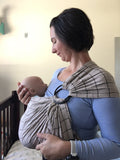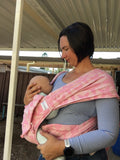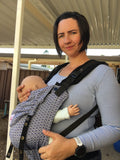Breastfeeding in a baby carrier
Breastfeeding and babywearing are separate skills best learned individually before attempting to do them both at the same time.
Breastfeeding in some carriers is more complex than others. Below is a list showing the ease of use with soft structured carriers being the easiest to get the hang of and stretchy wraps and woven wraps being the most advanced.
In my experience, it is much easier to breastfeed in a carrier once your baby has developed neck strength and is able to support their own head.
While nursing in a carrier it is important to regularly check your baby’s position and ensure that they are not slumping in the carrier. Once your baby has finished breastfeeding it is important to lift your baby back up onto your chest into the safe babywearing position.

TICKS used with permission of the UK Sling Consortium, please credit when used.
Breastfeeding in a ring sling
 1. Support your baby’s weight
1. Support your baby’s weightSome people may be comfortable switching shoulders enabling them to feed on both sides but generally, most people have a preferred side that they wear the ring sling, thus breastfeeding is restricted to one side while using a ring sling.
This may be fine if you need to nurse quickly to settle bub but not ideal if your bub tends to feed on both sides in one nursing session. To avoid becoming engorged and the risk of mastitis it is best to offer alternate breasts for each nursing session.
Breastfeeding in a stretchy and woven wrap
Breastfeeding in a stretchy or woven wrap is a more advanced option and should only be attempted once you are confident with the wrapping! It is a great idea to practice with a prop, a doll for example to get the hang of repositioning.
REMEMBER
Always keep one hand on your baby supporting their weight. Do not let go of the wrap once you untie or you will lose all tension and could risk dropping your baby.
- Support your baby’s weight
- Untie the knot and loosen the wrap job slightly
- Lower baby to breast height slightly to the side you intend to nurse on
- Check that the seat is still intact and readjust if needed
- Re-tie the wrap securely
If you wish to switch sides while nursing simply shuffle baby to the other side. As your baby is already lower you may not need to loosen the carry at all.
Breastfeeding in a Meh dai

Breastfeeding in a meh dai is very similar to feeding in a wrap carrier
- Support your baby’s weight
- Untie the knot
- Lower baby to breast height slightly to the side you intend to nurse on
- Re-tie the carrier securely
Breastfeeding in a structured carrier
Loosen the waistband slightly – Do not undo any buckles
Loosen the shoulder strap by positioning your thumb under the shoulder strap adjuster and push backward
Lower the carrier so your baby is positioned with their head at breast height
Scoot the carrier and your baby to the side that you wish to nurse on
Continuously monitor your baby
Keep your hand on baby to ensure they are supported at all times
Regularly check their airways remain clear
Breastfeeding in a carrier is not 100% hands-free but it can help support some of your baby’s weight and makes it easier to feed on the go.


